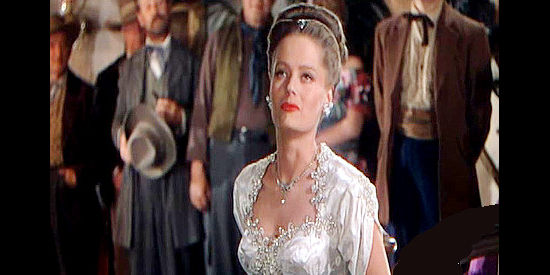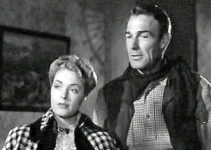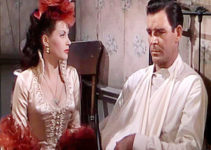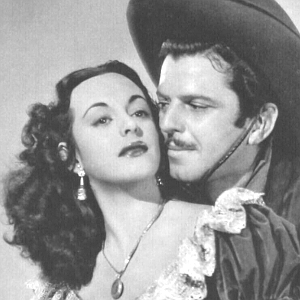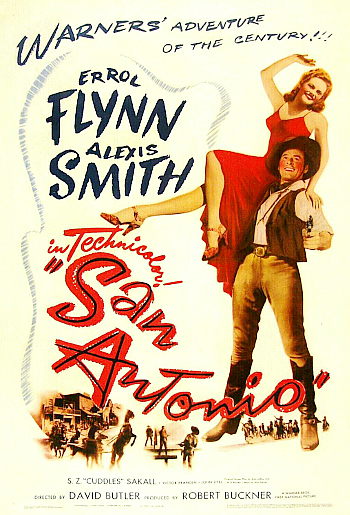 Rustlers are driving Texan cattlemen out of business, and outlaws are taking control of the territory around San Antonio.
Rustlers are driving Texan cattlemen out of business, and outlaws are taking control of the territory around San Antonio.
But Clay Hardin (Errol Flynn) plans to put a stop to that, returning to San Antonio against the advice of good friend Charlie Bell (John Litel) after being nursed back to health in Mexico after an earlier run-in with those very same bandits.
He quickly encounters a pretty entertainer named Jeanne Starr (Alexis Smith), who just happens to have been hired by Roy Stuart (Paul Kelly), the man Hardin is after.
As a result, Hardin isn’t quite sure which side Miss Starr is on, especially after being ambushed during a romantic interlude her balcony.
As for Stuart, he has an uneasy alliance with a partner named Legare (Victor Francen). Neither would miss an opportunity to do away with the other, if they could only figure out a way not to be hurt in the process.
For the time being, both are interested in getting their hands on a key piece of evidence Hardin plans to use to bring Stuart to justice — a tally book including bills of sale for cattle that weren’t his to sell.
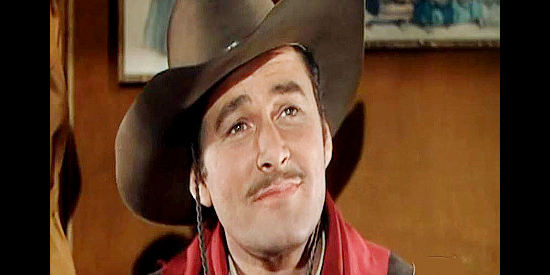
Errol Flynn as Clay Hardin, imagining the bright future he could enjoy with the right woman by his side in San Antonio (1945)
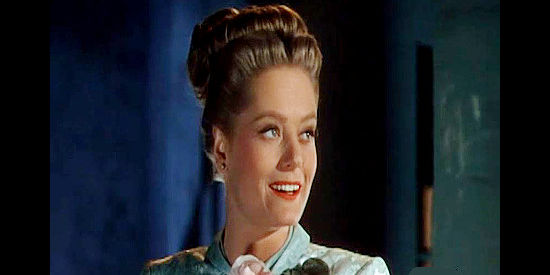
Alexis Smith as Jeanne Starr, amused by Clay Hardin’s dream of a future home surrounded by cattle in San Antonio (1945)
Flynn is back with his swash-buckling charisma, standing up against odds other men wouldn’t dare face and romancing Alexis Smith in his spare time.
This isn’t his best film — or his best Western made during the 1940s — but it’s entertaining.
S.Z. Sakall and Florence Bates play Smith’s traveling companions (aka protectors) and are around to provide some comic relief since they didn’t bargain for a gig in a place as dangerous as San Antonio turns out to be.
But the best chuckles come when Smith and Flynn are verbally jousting. There’s plenty of action too, including a final shootout in Stuart’s saloon that seems to involve every living male in San Antonio, followed by a horse chase that winds up in a river.
Smith and Flynn would be paired up again five years later in “Montana” (1950), an even better film. Here, Smith belts out a couple of saloon tunes, including “Some Sunday Morning,” which would later become a hit for Frank Sinatra. According to IMDb, the singing voice we hear is actually that of Bobbie Canvin.
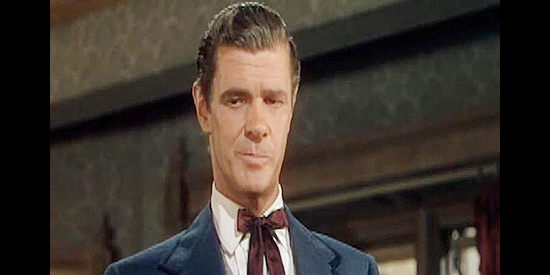
Paul Kelly as Roy Stuart, head of a rustling operation whose tally book falls into the wrong hands in San Antonio (1945)
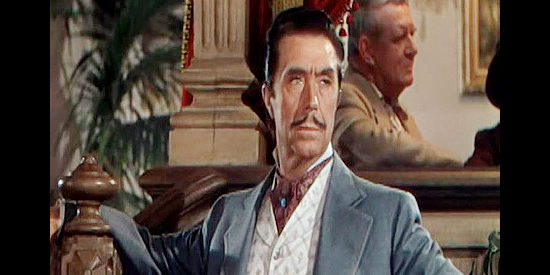
Victor Francen as Lagare, Roy Stuart’s untrusting partner and the man who hires Jeanne Starr to perform in San Antonio (1945)
Directed by:
David Butler
Cast:
Errol Flynn … Clay Hardin
Alexis Smith … Jeanne Starr
S.Z. Sakall … Sacha Bozic
Victor Francen … Legare
Florence Bates … Henrietta
John Litel … Charlie Bell
Paul Kelly … Roy Stuart
Robert Shayne … Capt. Morgan
John Alvin … Pony Smith
Monte Blue … Cleve Andrews
Robert Barrat … Col. Johnson
Pedro de Cordoba … Ricardo Torreon
Tom Tyler … Lafe McWilliams
Runtime: 109 min.
Songs:
“Some Sunday Morning”
“Somewhere in Monterey”
performed by Alexis Smith
(dubbed by Bobbie Canvin)
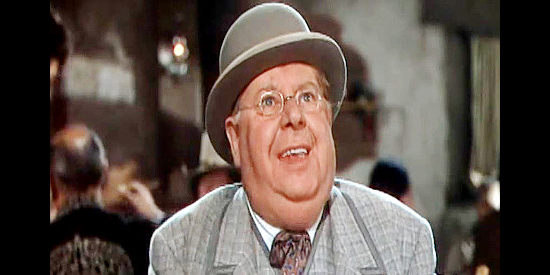
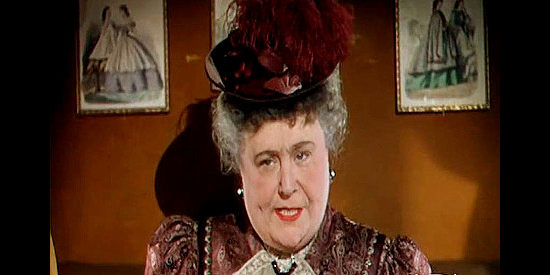
Florence Bates as Henrietta, Jeanne Starr’s assistant, disapproving of her new acquaintance in San Antonio (1945)
Memorable lines:
Mexican official to Charlie Bell when he tries to cross the border: “We will have peace in Mexico, even if every day we must fight.”
Singer Jeanne Starr to Hardin, after he explained how all his cattle were stolen: “Didn’t you ever think of putting them in at night?”
Jeanne Starr: “Do you know what’s happening at Delmonico’s this very moment?”
Clay Hardin: “Monico? Who’s he?”
Jeanne: “He is a famous New York restaurant. Some actress, not a bit more talented than I am, is sitting at a lovely table having lobster and crepe suzettes and champagne.”
Clay: “Sounds like she’s a cinch for the hiccups.”
Roy Stuart, indicating Jeanne Starr: “Is that your girl?”
Clay Hardin: “Could be? We haven’t decided yet.”
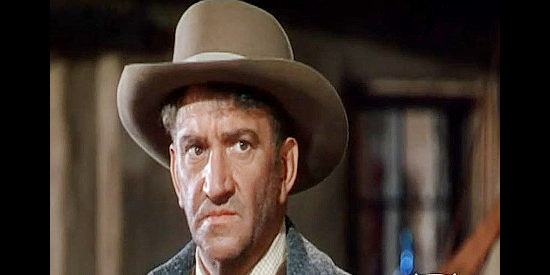
John Litel as Charlie Bell, the friend who helps Clay Hardin watch out for trouble in San Antonio (1945)
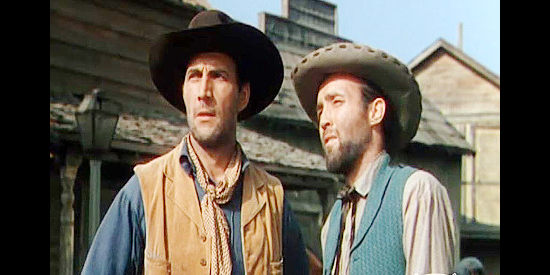
Tom Tyler as Lafe Williams and John Alvin as Pony Smith, sent to do away with Clay Hardin before he can cause problems in San Antonio (1945)
Jeanne Starr: “I’m sorry I threw those things at you this afternoon.”
Clay Hardin: “Oh, that’s alright. Usually you have to stand in line to throw things at me.”
Singer Starr, responding to Hardin’s description of the splendors of Texas: “Your old cows scare me to pieces with those long antlers, or whatever you call them.”
Jeanne Starr of San Antonio: “This town is full of men who look like they’d step on baby chickens.”
Clay Hardin: “There’s always one more drink left in the jug.”
Sacha Bozic, as they prepare to leave San Antonio and Clay Hardin behind: “Jeanne, if you feel so badly, we don’t go someplace (else). We won’t leave until we all get killed here. If that is what you want.”
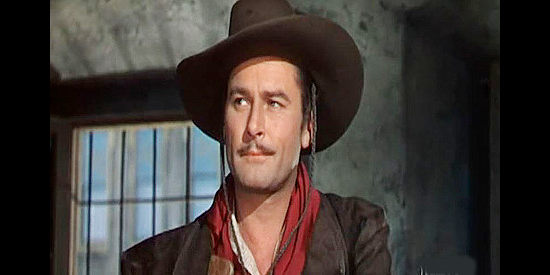
Errol Flynn as Clay Hardin, determined to find a friend’s killer and stop the rustling in San Antonio (1945)
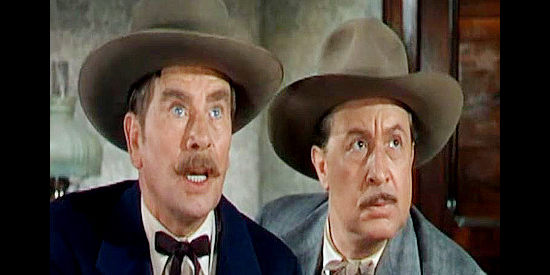
Wallis Clark as Tip Brice and Monte Blue as Cleve Andrews, ranchers who agree to back Clay Hardin in his quest for justice in San Antonio (1945)
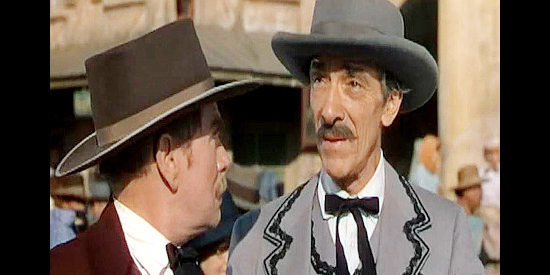
Pedro de Cordoba as Ricardo Torreon, one of the ranchers whose herd has been decimateed by rustlers in San Antonio (1945)
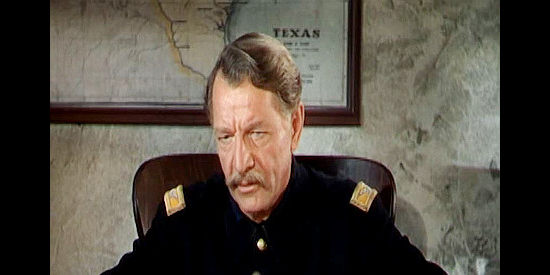
Robert Barrat as Col. Johnson, agreeing to give Clay Hardin 24 hours to prove his case in San Antonio (1945)
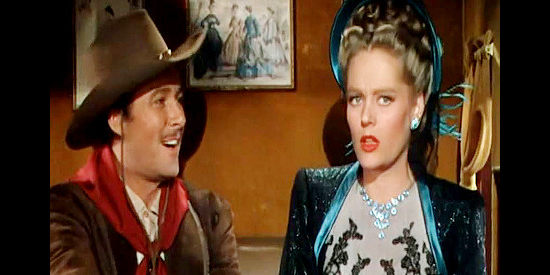
Errol Flynn as Clay Hardin and Alexis Smith as Jeanne Starr, learning she’ll be performing in a saloon in San Antonio (1945)

